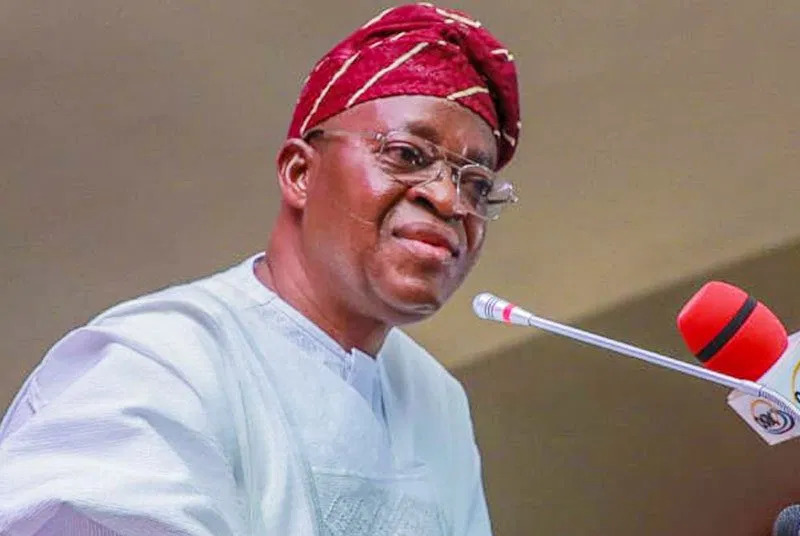The Governor of Osun State, Adegboyega Oyetola, appealed the Federal High Court’s judgment that nullified his nomination as the candidate of the All Progressives Congress (APC) for the 16 July governorship election in the state.

This is contained in a statement by his Chief Press Secretary, Ismail Omipidan, on Wednesday in Osogbo.
Oyetola in the statement described the Federal High Court’s judgment as a miscarriage of justice and, therefore, urged the Court of Appeal to set aside the ruling of the lower court and affirm their nominations as valid and lawful.
Justice Emeka Nwite, of the Federal High Court, Abuja, on Friday, nullified Oyetola’s candidacy and that of his deputy, Benedict Alabi, following the suit filed by the Peoples Democratic Party.
Nwite based his ruling on the grounds that Gov. Mai Mala Buni of Yobe, who had submitted their names to the Independent National Electoral Commission, INEC, violated the provisions of Section 183 of the Constitution of the Federal Republic of Nigeria and Section 82(3) of the Electoral Act, 2022
The statement, however, said Oyetola and Alabi, in an appeal filed by the APC through their counsel, Dr. Abiodun Layonu (SAN) and Mr. Abdulfatai Oyedele, listed 19 grounds of appeal against the lower court’s judgment.
In the appeal, the governor and his deputy argued that all the actions taken by Gov. Buni in respect of their nominations were valid and legally recognizable, saying they complied with the provisions of the Electoral Act 2022 and the 1999 Constitution of Nigeria.
The statement further argued that the PDP lacked the locus to commence the legal action against Gov. Oyetola as the issue of nomination of the candidate was an internal affair of political parties.
“By the provision of Section 84(14) of the Electoral Act 2022, it is only an aspirant that participated in the primary election that can complain that the provision of the Electoral Act and the guidelines of the political party have not been complied with in the selection or nomination of candidate of a political party for an election.
“The issue of nomination and sponsorship of candidates of a political party is strictly an internal affair of a political party which is not justiciable.
“The 1st respondent (the PDP), therefore, lacks the locus standing to bring any cause of action that relates to internal affairs of the appellant (APC),” it said.
According to the statement, another ground of appeal filed by the appellant is that the suit initiated by the PDP had been taken care of by the issue of ‘estoppel’ which indicates that were an issue had been decided by a competent court, the court will not allow it to be re-litigated by different parties.
“The principal issue raised by the 1st respondent (PDP) before the trial court is whether the 3rd and 4th defendants (Oyetola and his deputy) were validly nominated and sponsored for the governorship election held in Osun on the 16th of July, 2022.
“This same issue involving the same parties has been laid to rest in the case of JEGEDE V. INEC (2021) 14 NWLR (1797) 409 and the plaintiff suit as presently constituted is a duplication, repetition, and remake of what has been settled and decided by the Supreme Court in the said case.
“The provisions of Sections 180 and 183 of the Constitution upon which the decision of the Supreme Court in JEGEDE V. INEC was based is still very extant”, it said.
The appellant, therefore, held that the suit filed by the PDP was an abuse of the court process and that the trial court lacked the jurisdiction to adjudicate on it.
It also argued that the suit filed by the PDP was statute-barred as the party failed to file the case within the time frame stipulated by the constitution, hence the court lacked the jurisdiction to adjudicate upon it.
“The law stipulates that every pre-election matter must be filed within 14 days from the date of occurrence of the event, decision and act complained of in the suit. The period within which to file action elapsed on the 31st of March, 2022, and the PDP filed the suit on 7 April.
“Therefore, the court lacks the jurisdiction to adjudicate upon the 1st respondent’s suit as the action was statute barred.
“The act complained of came into existence on or before 18th March 2022 and not 25th March 2022 as claimed by the 1st respondent”, it said.
Comments are closed.